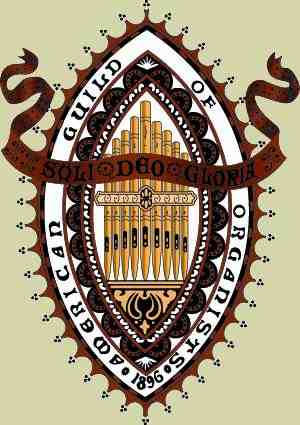
 Pittsburgh Chapter
Pittsburgh Chapterof the
American Guild of Organists

 Pittsburgh Chapter
Pittsburgh ChapterAnnouncing the 38th Season of the Organ Artists Series!
As we look forward to the summer months, please take a moment to mark your calendars for next year, when the Organ Artists Series will present its 38th season.
Sunday, October 16, 2016 3:00pm David Higgs at East Liberty Presbyterian Church
Co-presented with East Liberty Presbyterian Church’s Cathedral Concerts
Friday, November 18, 2016 8:00pm Chelsea Chen at Heinz Memorial Chapel
Co-presented by a Pittsburgh Chapter A.G.O. member in memory of Dr. Robert Sutherland Lord
Friday, February 17, 2017 8:00pm Carol Terry at Saint Paul Cathedral
Co-presented by the St. Paul Cathedral Concert Series
Sunday, April 23, 2017 3:00pm at Shadyside Presbyterian Church
Co-presented by Shadyside Presbyterian Church’s Music in a Great Space
You will be receiving more detailed information in a mailing to be sent this summer.
The Board expresses its gratitude for all the support that makes this Series possible.
Organ Artists Series – John D. Henninger – Director
Committee Members: Mark A. Anderson, William C. Gladden, Gail M. Henry,
Sara Kyle, J. Barbara McKelway, Stephen R. Schall, C. John Thickey
Ex Officio Members: Nathan Carterette, Donald K. Fellows, Edward A. Moore
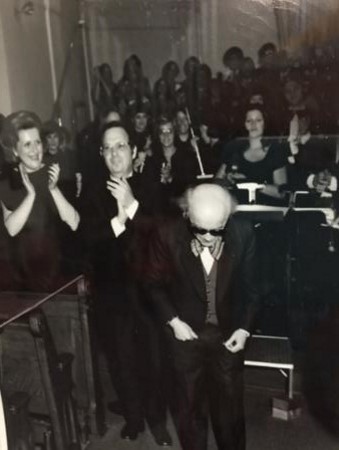 Jean Langlais performing at |
Sacred Music Program At Duquesne Turns 40
By Ann Labounsky– Chapter Member
This year we celebrate the fortieth anniversary of the Sacred Music programs at Duquesne University. We inaugurated the program in October of 1976 when we awarded an honorary doctorate degree to Jean Langlais with a series of lectures, concerts, and premiers of his works including Voix du Vent for Chorus, Orchestra, and Soloist, and his third organ concerto. Since that time our program has program has continued to grow. Three graduates work in universities (Andrew Scanlon at East Carolina University in Greenville, North Carolina; Jason Keefer at Pontifical College Josephinum in Columbus, Ohio; and Nicholas Will at Franciscan University, Steubenville, Ohio). Our current students and graduates hold positions in churches around the country with many in the Pittsburgh region.
One of the most recognized sacred music programs in the country, the Sacred Music degree emphasizes the spiritual and musical development of graduate students and educates them to become Ministers of Music through a full range of church music courses, practical training, church internships and work in the Duquesne University Chapel. Graduate students may take applied studies in organ, piano, voice and directed study in choral conducting. Graduate students perform on Duquesne’s beautiful Steinway pianos and have access to a variety of superior organs in the Pittsburgh area. Other courses include: Service Playing, Improvisation, Sacred Choral and Solo Literature, Organ Pedagogy, Liturgics, History of Christian Worship, and Gregorian Chant.
Our faculty includes Ann Labounsky, Ph.D. FAGO, Chm. Chair; Benjamin Cornelius- Bates, MM, FAGO; Organ and Sacred Music; Caron Daley, DMA, Choral Conducting and Paul Miller, Zvonimir Nagy, Judith Bowman, Music History and Theory. Visiting professors and clinicians past and present include: Wilma Jensen, Richard Spotts, David Craighead, Volodymyr Koshuba, Micky Thomas Terry, Jon Gillock, André Marchal, Jean Langlais, and Sheila Page, among others. The faculty of the Church Music Association of America including William Mahrt, David Hughes, Susan Treacy, and Horst Buchholz, and Jennifer Donelson have taught at Duquesne University in the summers
Updated console in organ studio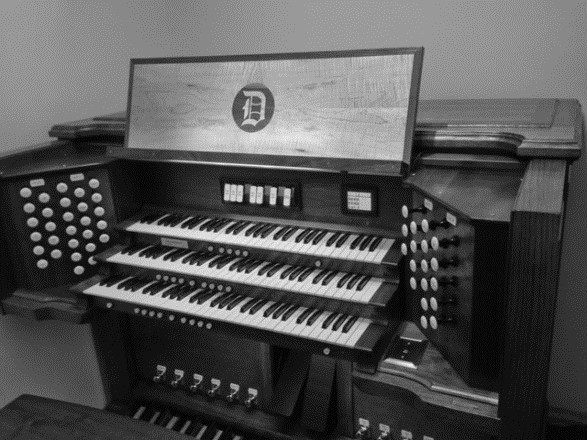
This summer a course in the Ward Method of teaching Gregorian Chant to children will be offered taught by Scott Turkington. The Chant Intensive course will be taught by Wilko Brothers from the Netherlands.
Part-time Graduate students receive a 50% Lay Music Minister’s discount if they are working in a church of any denomination. All students are required to take one of the AGO certification exams during their training. The weekly noon masses in the chapel each Monday give the students opportunities to plan the liturgies, direct the choir, serve as lectors, and cantors. This outlet has also given many students the impetus to compose responsorial psalms and other original choral and organ works. A new university and community choir is being established by Dr. Caron Daley which will meet Tuesday evening in the Duquesne University Chapel.
Every two years we travel to Europe to study the instruments there. Tours have included Austria, Germany, and France. This Sunday we will make our first trip to England in cooperation with Peter Luley.
Our Duquesne University AGO Chapter enjoys a close relationship with the Pittsburgh chapter and the generous support of its membership continues to provide dinners free of charge to our students as well as free admittance to the Organ Artist Series concerts.
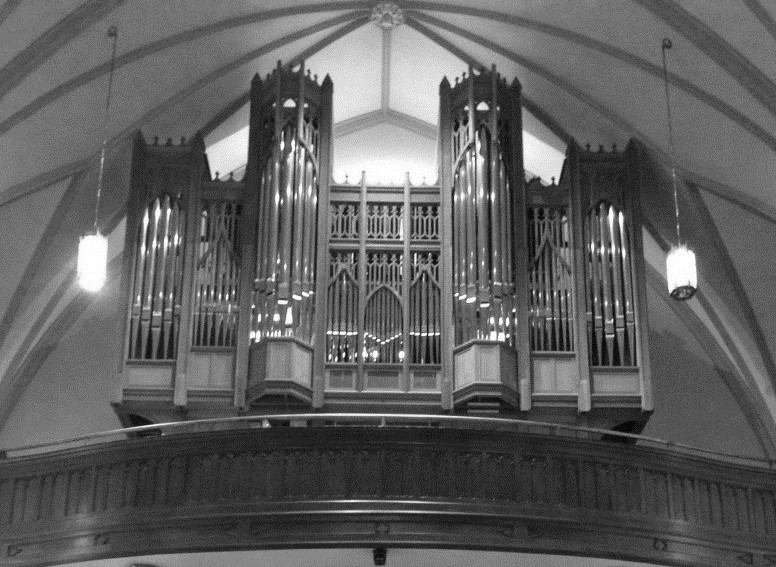 Current students have remarked that :
Current students have remarked that :
Duquesne University has a wonderful and supportive environment in which a student can learn and become a better musician. The teachers at Duquesne are very encouraging. They care about their students and are passionate about helping them succeed as well-rounded musicians. The community of people that you meet at Duquesne also creates a great and friendly environment. Everyone wants you to do well! Because the organ department is smaller, you definitely get to know everyone and make lasting friendships. Each person helps you grow and challenges you as an organist. Finally, Duquesne has a great location. Pittsburgh provides so many opportunities for students to gain experience in their field, especially in the arts. From leading and directing music in a parish, to singing a choir off campus, this city allows students to share and develop what they learn at Duquesne. Duquesne University has been a very good experience for me!
Being in an environment with professors and peers that want what's best for you has helped me grow overall as a musician. The size ratio between students and teachers also creates an excellent learning environment, with great, available assistance from the professors. There are great resources in Pittsburgh, whether you are on the Duquesne campus, with great instrument options, or have the opportunity to play on one of the many great organs throughout the city. There is also a lot of great opportunity for jobs in Pittsburgh. Pittsburgh also has a rich music scene, with the renowned Pittsburgh Symphonic Orchestra, multiple great choirs, theater, opera, and jazz.
Former students noted:
During my time at Duquesne University, I was exposed to the world of Gregorian chant, something I had never studied. At the end of my freshman year, I was fortunate enough to travel with the sacred music department to the Solemnes Abbey, where I experienced authentic chant firsthand. In application to the organ, I have studied improvisation in the style of Tournemire using chant themes, as well as repertoire by Langlais, Tournemire and Duruflé that uses chant as the referent.
…there are so many things --- a sense of camaraderie and a willingness of everyone to help; courses that were very helpful in dealing with parish lives; common liturgical practices; organs and musical knowledge; facilities -- always a way to have practice time – the new instruments and their benefits in understanding many different styles.
The new instruments have given us the single most noticeable change in the Duquesne musical landscape – there is a new Dan Jaeckel mechanical-action organ of 25 ranks modeled after the aesthetic of Charles Tournemire in the Duquesne University Chapel. The three-manual Moëller organ in 314 and two manual Aeolian-Skinner instrument in 216 has been greatly expanded by Peter Luley complete with solid state combination action. The two-manual Schlicker mechanical-action organ in room 107 had belonged to composer Paul Manz. In addition to the organs Duquesne houses several harpsichords and a harmonium.
Cameron Carptenter – Practice and Performance
By Gail Henry – Chapter Member
On Friday, April 15, approximately twenty Guild members and friends attended an open rehearsal of the Pittsburgh Symphony as Manfred Honeck, conductor, and Cameron Carpenter, organist, finished their work on Carpenter’s performance of the Rachmaninoff Paganini Variations. Afterward Carpenter spent almost an hour with the group. He talked about his childhood, current performance schedule, the touring instrument on which he plays and the philosophy behind its creation.
He was humble, polite and very generous with his time on a performance day. Predictably it was the final topic that elicited the most passion from Carpenter. He is, of course, well known as a proponent of digital organ technology. That topic seems to provoke even more reaction than his avant-garde wardrobe and haircut.
I hope that many Guild members were able to hear his international touring organ (ITO) in order to draw their own conclusions about its sound. In addition to attending the rehearsal I was also at Heinz Hall for the Sunday performance. Regardless of your dislike or love of the ITO’s sound I will offer the opinion that it was a good day for the organ in general because of the excitement this performance generated.
The ovation for Carpenter’s performance was swift. His encore of The Stars and Stripes Forever surely amazed the audience as he played the piccolo part in the pedal. After that, Honeck slid onto the bench and led the audience in singing Happy Birthday to Carpenter, as it was his 35th birthday, and he spoke about how much it meant to him for his father to hear him in person that afternoon.
There was a crowd at the edge of the stage at intermission as people wanted a closer look at the console. I thought there was a great affection in the room for what had transpired in the first half, and the conversations around me were full of ‘buzz’ about what they had just heard and seen.
I still prefer the Rachmaninoff on the piano, but I do think our King of Instruments was cast in a positive light on this weekend.
Being a Parishioner in Lilongqe, Malawi, Africa
Editor's note: Elizabeth spent time abroad as a Fulbright Scholar over this past year. We're happy to have her back in our environs and grateful that she took the time to give us a perspective and reminder that music brings joy in many forms and many ways. She can often be found at an AGO meeting if you'd like to chat further with her about this unique experience. |
By Elizabeth La Rue, Ph.D., MLS, SPC – Chapter Member
While living eight months in Lilongwe during 2014-2015, I attended a Pentecostal, Assembly of God church, four or so times and then became a regular parishioner at an Episcopalian church. Jon Danzak was requesting content for the monthly newsletter so I thought sharing some of my experiences might be an interesting read.
I lived in a non-expat part of Lilongwe so I was the token foreigner. I was within a 30 minute walk to both churches. The next paragraphs will share what I learned about presenting music for the Glory of God from my attendance at both churches.
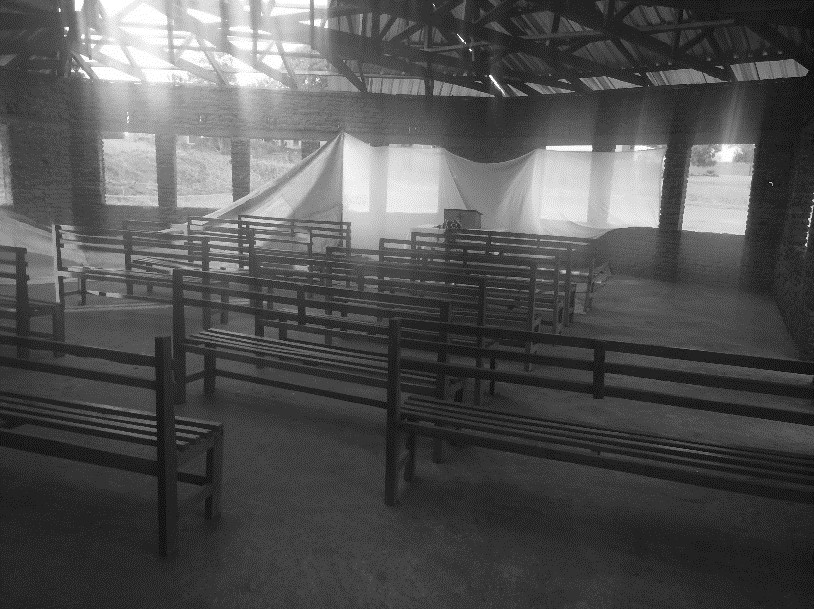 The interior of the Pentecostal, Assembly of God Church. The congregation was building the church. Within the eight months I was there the congregation was able to raise enough funds to nearly add a complete metal roof. The sheets for the windows only appeared on Sundays. |
The Pentecostal Assembly of God Church
I attended this church as a guest of the cook, Nancy, at the house where I stayed and was the only foreigner in the congregation. Being escorted by Nancy, we arrived around 9:30. She was nonchalant about being late. The service was scheduled to begin at 8am. It seemed that the service was still getting assembled at 9:30, as the 20 some people there seemed unsettled. At some deemed time, unbeknownst to me, one to two congregants would move to the front of the pews and begin clapping hands. There was no piano or electric organ; no song books, hymnals, song sheets or video projection of words. Actually, there was no electricity. Congregants would stand, begin to sway and join in the clapping. One of the song leaders would begin singing and overtime everyone would join in, singing loudly, and boldly. There was no, “under the breath,” mimicking of singing. Foot stomping, swaying, spinning and raising of hands would occur as the persons felt the Spirit move them. When a song would end, it slowed, quieted, and with barely a breath permitted, the song leader would begin a new song. Nearly all of the songs were primarily in Chichewa, the native language to Malawi, and sometimes have a refrain in English. Extending my participation beyond hand clapping and swaying, I attempted to join in singing the English refrains. After about 45 to 60 minutes of impromptu worship through song, the parishioners would come to a singing lull and begin personalized vocal prayer, all speaking at once and sometimes yelling, for 15 minutes or so. When that came to a silence, people found a seat on the benches and the minister stepped to the front and began sermonizing. There was no more singing, just listening and agreeing to the Word. Mostly the service was in Chichewa – which I did not understand. These Sunday services would last four to six hours. By the time I would leave, maybe two hours in, (I couldn’t sit that long so I never stayed for a whole service.) there would be 40+ people and 60+ children.
Saint Peters Anglican Church
The service at Saint Peters began at 8am and ended around 9:15/30, so it followed suit to the Episcopalian/Lutheran service length. They had an electric organ at the front of the church but no regular organ player. At times, someone would play the organ, and at times, someone some one would come along with a drum set and play. When the drummer attended the service became very loud. When the organ player was there he didn’t have music but would chord around while people sang. Undoubtedly there would be a high moment in the singing and he would add a full keyboard glissando; and if not, he would do a glissando at the end of the hymn. I will share that I cringed every time this occurred.
Most often though, there was no organ player and no drummer. Most common would be that three people formed a choir and at times, up to seven people. They were always in the front two pews and never turned to face the congregation. This church had hymnals but they had no music printed in the book. They contained only the English versus and some Chichewa hymn text. At the beginning of the service, a choir member would loudly speak a page number with hymn title and then start singing. The congregation would join in loudly and proudly, irrelevant of an understood tune or key. I knew a good many of the hymns and was always impressed how the song leader would get the hymn tune right without any music. The congregants would harmonize with a well-known hymn tune and it was absolutely beautiful. Not because of the vocal quality or the accuracy of the pitch but because of the confidence and purpose in which they were singling.
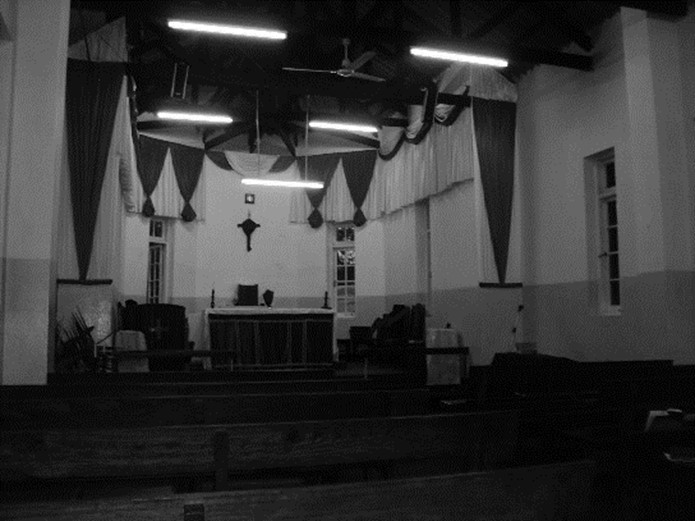 |
The beginning of the service would have three to four hymns and then proceed in the typical liturgical format. On occasions there would be clapping along with singing but not often. I was often the only foreigner at this church. At times a Scottish lady would attend and every now and then, one or two other foreigners. This church averaged 40-120 a Sunday. Most did not arrive before the service began but always within the first 15 minutes. One time the minister reprimanded the congregants for coming late! Most of the service was in English.
I attended St. Peters on my own. Most houses and some buildings were behind brick or concrete walls and St. Peters was of these. On one of my morning walks I heard singing behind a wall and crept through the open gate to investigate. Looking in the windows I saw the congregation was not large and that they sang well. It took a lot of nerve to go alone but I did and it was fine. Although, I was unaware that women were to sit on left side of the congregation and men on the right. Of course, I selected the right side to sit and experienced more looks than just the normal staring awarded to foreigners. Graciously one or two other women sat on the right side so I was not completely segregated from my gender.
In closing, one of the most memorable services at St. Peters was the Christmas Eve service of Lessons and Carols. There were no decorations for Christmas in Malawi, like here in the U.S. The local grocery store, run by Indians, had cheap Chinese Christmas décor but that was all. St. Peters was the only place outside of the grocery that had a Christmas tree and they had decorated it for Christmas Eve with the available cheap Chinese Christmas blinking lights and a few plastic ball ornaments. Truly, it was tacky. Nancy asked to accompany me to this service as her church did nothing for Christmas Eve but had a 24-hour service on Christmas Day. The priest, Nancy, me, the Scottish lady, her husband, and maybe three others were the only congregants for Lessons and Carols. With such a small number I was recruited to read a lesson. I felt very out of place, but agreed, and read from the pulpit. The singing was still great and they defaulted to me to secure some of the carol tunes. It was hard to pull a tune from memory when it had not been heard for a year and had no music. Lessons and Carols in 98-degree heat, no moving air, and with candles burning while surrounded by tacky Christmas decorations became Christmas. There were no gifts given and no parties. Saying, “Happy holidays” was not heard. Christmas was Christmas. The Catholics, Presbyterians, Anglicans and Churches of Christ celebrated it all alike, on Christmas Day and all said, “Merry Christmas.”
For the Glory of God
What I learned during my time in Malawi about presenting music for the Glory of God…no one should be shy about his or her natural instruments; voice, foot stomping, body movement, and clapping. Music is somewhat planned and always happens. It is not perfect, but it is beautiful through innate skill and a desire to give thanks.
Inspiration and Information - Workshop and Reading
By J. Barbara McKelway – Chapter Member
Inspiration and Information: A Day of Workshops and Reading Sessions will be held Saturday, August 27th at Oakmont Presbyterian Churc (see Noteworthy Events). Our host is Chapter Member Michael Frank.
The day will begin at 8:30am and the last sessions will end around 3:30pm. After brief worship there will be sessions involving many aspects of worship: choirs (adult, youth, children), handbells, organ, piano, techniques for choirs, etc. Lunch is provided. Volkwein’s Music Store will also provide music and have a small area where attendees can browse music and purchase. The workshop is presented by the Pittsburgh Chapter of The Presbyterian Association of Musicians (PAM). For more information contact Barbara McKelway after June 15th at 412.366.4513 or bmckelway@verizon.net.
Also in the Convention news…. Two Pittsburgh Chapter members, Benjamin Cornelius Bates and Joyce Moon Strobel, have had compositions accepted for inclusion in the AGO Houston National Convention. This convention is creating a Bayoubuchlein (Houston being situated on a bayou), a collection of chorale preludes based on modern hymn tunes (Nothing composed before 1960). Both Joyce and Benjamin had two pieces accepted for the book; and each will have one performed during the Thursday evening concert. The collection of all pieces accepted will be published by Selah publishing. Pittsburgh is being well represented at this coming Summer National Convention.
Membership Renewals Will Be Coming Up Soon
J. Barbara McKelway- Registrar (registrar@pitago.org)
Music has the power of producing a certain effect on the moral character of the soul, and if it has the power to do this, it is clear that the young must be directed to music and must be educated in it. |
Reminder - AGO Renewals Via ONCARD
Remember AGO renewals are now on-line through the ONCARD system. To use the system you will need your ID from the back cover of your issue of The American Organist (TAO) to the left of the date.
If you have any problems, please contact the Chapter Registrar, J. Barbara McKelway, for assistance at registrar@pitago.org or 412.366.4513.
Resources
Discount On Email Service Normally the Chapter charges $25 ($35 for non-members) for an email to be sent out to the Chapter. If you purchase 4 in advance for $100 ($140 non-members) you get an additional one free for a total of 5! Consider updating your budget to allow for this great new service and get the word out to the Chapter about your events and programs! |
Click below to: These links are also the top-left corner of the main page for your convenience! |
Pipedreams, nationally acclaimed program of organ music, For full details, check the program web site at www.pipedreams.org |
Copyright © 2025, Pittsburgh Chapter of the American Guild of Organists. All rights reserved.